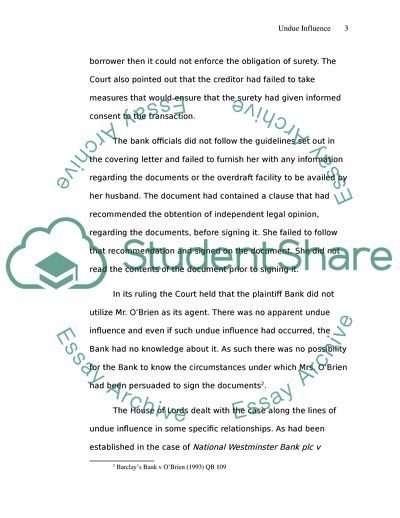Cite this document
(Undue Influence in Mortgages Literature review Example | Topics and Well Written Essays - 2177 words, n.d.)
Undue Influence in Mortgages Literature review Example | Topics and Well Written Essays - 2177 words. Retrieved from https://studentshare.org/finance-accounting/1711236-briefly-discuss-the-law-relating-to-undue-influence-in-mortgage-transactions-since-barclays-bank-v-obrien-and-assess-the-extent-to-which-the-current-law-offers-adequate-protection-to-a-vulnerable-party
Undue Influence in Mortgages Literature review Example | Topics and Well Written Essays - 2177 words. Retrieved from https://studentshare.org/finance-accounting/1711236-briefly-discuss-the-law-relating-to-undue-influence-in-mortgage-transactions-since-barclays-bank-v-obrien-and-assess-the-extent-to-which-the-current-law-offers-adequate-protection-to-a-vulnerable-party
(Undue Influence in Mortgages Literature Review Example | Topics and Well Written Essays - 2177 Words)
Undue Influence in Mortgages Literature Review Example | Topics and Well Written Essays - 2177 Words. https://studentshare.org/finance-accounting/1711236-briefly-discuss-the-law-relating-to-undue-influence-in-mortgage-transactions-since-barclays-bank-v-obrien-and-assess-the-extent-to-which-the-current-law-offers-adequate-protection-to-a-vulnerable-party.
Undue Influence in Mortgages Literature Review Example | Topics and Well Written Essays - 2177 Words. https://studentshare.org/finance-accounting/1711236-briefly-discuss-the-law-relating-to-undue-influence-in-mortgage-transactions-since-barclays-bank-v-obrien-and-assess-the-extent-to-which-the-current-law-offers-adequate-protection-to-a-vulnerable-party.
“Undue Influence in Mortgages Literature Review Example | Topics and Well Written Essays - 2177 Words”, n.d. https://studentshare.org/finance-accounting/1711236-briefly-discuss-the-law-relating-to-undue-influence-in-mortgage-transactions-since-barclays-bank-v-obrien-and-assess-the-extent-to-which-the-current-law-offers-adequate-protection-to-a-vulnerable-party.


